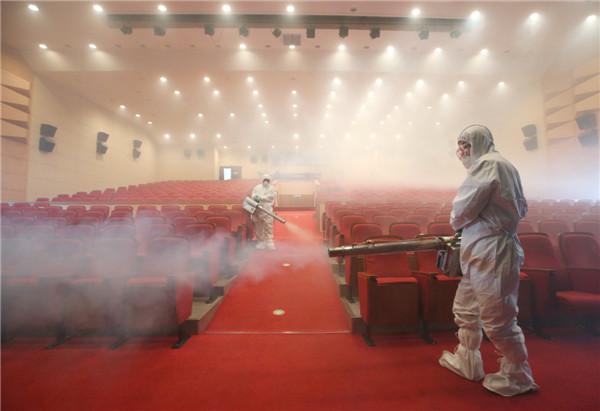WHO advises S.Korea to ban all MERS suspects' overseas travel
(Xinhua) Updated: 2015-06-13 14:17
 |
|
Workers in full protective gear disinfect an art hall in Seoul, South Korea, June 12, 2015. [Photo/Agencies] |
SEOUL - The World Health Organization (WHO) on Saturday strongly advised South Korea to ban all people suspected of being infected with the Middle East Respiratory Syndrome (MERS) or having contact with the MERS infectees from going abroad as the Asian country is suffering from an unabated spread of the disease.
Keiji Fukuda, assistant director-general for health security at the WHO, recommended it in the administrative city of Sejong during a televised press conference after wrapping up a five-day epidemiological study of the country's MERS outbreak.
The country's MERS infections increased to 138 Saturday as 12 more cases were discovered. One more death was reported, bringing the total death toll to 14 and the fatality rate to 10.1 percent. South Korea became the world's most MERS-contagious outside of the Middle East.
The 16-member joint mission comprising experts from the WHO and South Korea, co-headed by Fukuda and Lee Jong-koo, chief of JW LEE Center for Global Medicine under Seoul National University College of Medicine, staged the joint study of confirmed cases and infection control for five days from Tuesday.
Fukuda urged South Korea to completely figure out who had contact with the MERS infectees, to quarantine and monitor all the potential carriers of the corona virus, and to completely carry out infection prevention and control in all medical facilities.
The WHO official stressed that whoever had contact with the infectees and all potential carriers should not travel, especially should not be allowed international travels during the incubation period, saying that South Korea has established a system to trace, quarantine and monitor the potential carriers.
South Korea has imposed the overseas travel ban on MERS infectees and potential carriers, but one South Korean man flied to China via Hong Kong last month before the travel ban, boosting worries about the MERS export to the world's most populated country.
Mutation has not occurred in the MERS virus found in South Korea, and the country's epidemiological pattern has been similar to the one in the Middle East, according to an available sequencing study.
There has been no evidence yet here for the MERS to spread in the community, but South Korea should continue to monitor a possibility for it, Fukuda said, expecting the MERS infections to be added further in the next several weeks given the large size and complicated pattern of the epidemic.
- S. Korea reports 11th death from MERS outbreak
- China's aviation regulator orders enhanced MERS control
- MERS quarantine ends for 75 under observation
- South Korea reports 10th fatality in MERS outbreak
- South Korea cuts rates as MERS clouds outlook; 14 new cases
- 31 suspected MERS cases tested negative in HK
- Risk of MERS on mainland rising, health officials say
- Chinese national confirmed MERS positive in ROK
- Potential MERS victims leave quarantine






